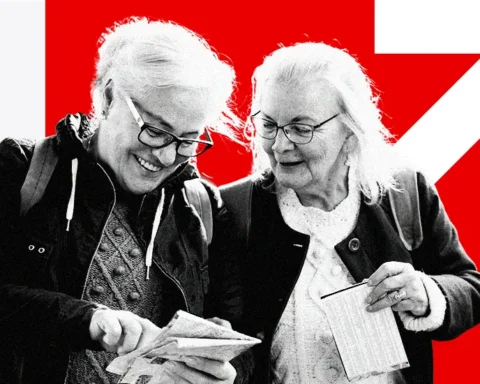The Secretary of State for Work and Pensions, Mel Stride, has insinuated that his successor will be confronted with increasing the state pension age to 68. This decision must be taken within the first few years of the upcoming parliamentary session, given the delayed decision due to the stagnation in life expectancy.
Stride suggested that while the decision remains unavoidable, it will likely be implemented by the subsequent Work and Pensions Secretary, ensuring that individuals receive a decade’s notice before the change. Despite existing uncertainties, he confirmed that there were “no current plans” to alter the triple lock that governs pension increases, though he refrained from providing a guaranteed assurance of its future security.
Stride’s comments came during a press briefing at Westminster in response to inquiries about potential government initiatives to revise future pension age plans, especially considering the recent civil unrest in France following similar propositions. The Secretary, a close associate of Rishi Sunak, stated: “I don’t foresee the UK resorting to riots and destruction over state pension issues. The decision to postpone was primarily due to the pandemic and economic instability, coupled with the necessity of providing people with a 10-year notice for any significant changes.”
The timeframe for elevating the state pension age from 67 to 68 falls in the 2030s. According to Stride, there’s no urgency to make the decision immediately; it can be deferred until the initial years of the next parliament while still ensuring a 10-year notice period for the public.
However, Stride emphasized the necessity of making a decision eventually. He explained: “Given the OBR’s fiscal sustainability reports projecting 50 years into the future, the demographic changes and pension costs are tilting unfavourably. So there will come a time when this thorny issue will have to be addressed, but it doesn’t need to be tackled until my successor is in the role.” This suggests Stride does not intend to serve as the Work and Pensions Secretary post the next election.
Regarding the triple lock on pensions, which assures that payments increase by higher inflation, earnings or 2.5%, Stride stated there were no plans to abandon it in the Conservative party’s next election manifesto. This year, Pensioners will witness a record growth of 10% when wage growth is only about 5.5% amidst high inflation.
Under the current scheme, the state pension age of 66 is slated to rise to 67 between 2026 and 2028 and further to 68 between 2044 and 2046 – impacting people born post-April 1977. A government review in 2017 proposed to advance the latter increase to the late 2030s, compelling millions born in the early 1970s, who had planned to retire at 67, to postpone their retirement by a year.
Earlier reports in January indicated that ministers intended to advance this rise to 2035, affecting individuals aged 54 and below, due to the Treasury’s lobbying efforts to curtail billions in state pension payments. However, with a general election anticipated next autumn, ministers were apprehensive about a possible backlash from middle-aged voters. The recent riots in France over a planned increase in the pension age from 62 to 64 have further heightened concerns among UK officials.
Stride emphasized that the UK’s approach to pension reform would differ from that of France, given the differing national attitudes towards such changes. Despite the potential for public backlash, he maintained that the UK would strive to ensure that the public is well-informed and given ample notice of any proposed alterations to pension plans.
In the face of speculation about the future of the pension triple lock, Stride repeated that there were “no current plans” to abandon the policy in the next Conservative party’s election manifesto. The triple lock ensures that pensions rise by the greater of inflation, average earnings or 2.5%, a cornerstone of the Conservative party’s commitment to pensioners.
The decision regarding the state pension age is one of many that will be left for his successor, Stride noted. He cited other challenges, including the need to address the rising costs associated with an aging population and the impact of demographic changes on the sustainability of the UK’s social security system.
“The issue is not just about increasing the pension age, but about how we ensure that our pension system remains sustainable in the long term, given the pressures from an aging population,” Stride said. He added that the public needed to understand the reasons behind any changes.
However, the proposed changes have already sparked concerns among certain groups. The potential for increasing the state pension age and the fear of removing the pension triple lock has led to anxiety among middle-aged and younger voters who worry about their future financial security.
UK officials are treading carefully in light of the recent upheavals in France following similar pension reform plans. They are acutely aware that any changes to pensions must be communicated effectively and implemented gradually to minimize the potential for social unrest. As the country moves closer to the next general election, the pension reform issue will likely feature heavily in the political discourse.
While the proposed pension age increase is a contentious issue, Stride and the Conservative party believe it to be an unavoidable step towards ensuring the long-term viability of the UK’s pension system. As the election approaches, the debate over the future of the state pension will undoubtedly continue to intensify.







